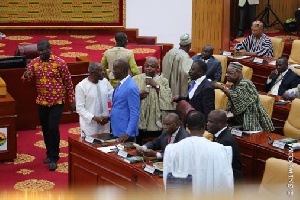The Minority in Parliament accused the government of three violations: 1. Conflict of interest 2. Borrowing without Cabinet Approval 3. Borrowing without Parliamentary approval
The government of Ghana released a press statement through the Ministry of Finance posted on the website of the Ministry but failed to address the issues bordering on conflict of interest which is a serious dealing that attracts severe punishment in other economies.
The Ministry of Finance is too simplistic about the explanations given especially when it was widely reported that the Attorney General of Ghana was not aware of the dealings.
The Ministry of Finance should take time to deal with the matter relating to conflict of interest.
The Securities and Exchange Commission should as a matter of public interest and securing the image of the government of Ghana and the Ministry of Finance should investigate the matter broadly and with dispatch.
The argument of the Ministry of Finance sought to explain to Ghanaians that the bond is actually a local bond that does not need Parliamentary approval.
This explanation should be subjected to the Ghana’s Public Borrowing Guidelines which was prepared taken into consideration legal requirement using the provisions of the 1992 Constitution, The Loans Act, the Public Procurement Act, Financial Administration Act and Risk Management principles.
Section 3.1.1 of the Ghana’s Public Borrowing Guidelines explain external debt as “external debt is defined on gross basis at any given point in time as disbursed and contractual liabilities of the central government to nonresidents to repay principal, with or without interest, or to pay interest, with or without principal.
Basically, external debt is therefore the amount owed to creditors/lenders which are non-resident of the country.
External borrowing sources are further segmented into four categories as Multilateral, Bilateral, Commercial and Private”.
It is clear that greater portion of the loan comes from private external source and by definition, it is external borrowing. Hence must comply with the approval requirements by Cabinet and Parliament.
Section 5.2 of Ghana’s Public Borrowing Guidelines explains the approval process within the various Departments at the Ministry of Finance.
The question is have they followed the approval requirements?
The Approval Stage “This stage begins from obtaining the Cabinet/Executive approval and ends at the Parliamentary approval through the following processes.
When both Cabinet and Parliament are in session, this stage should take a period of maximum five (5) weeks to complete.
Step V: Cabinet informs both MOFEP and the Sector Ministry of its approval or decision on the request submitted through the joint cabinet memorandum.
Further, in accordance with Article 181 of the 1992 Constitution of the Fourth Republic of Ghana and the Loans ACT of 1970 (ACT 335), which solely mandate the Minister of Finance and Economic Planning to borrow on behalf of the Republic of Ghana, Cabinet issues approval letter authorizng the Hon. Minister of Finance and Economic Planning to seek Parliamentary approval for the financing.
The Cabinet approval letter must indicate the project objectives, the financing terms and the decision of Cabinet on the matter”.
Another Question is whether the following have been complied with?
5.2.1 Documentations to Parliament These are the documents to be forwarded to Parliament for consideration:
i. Cabinet or an Executive Approval
ii. Parliamentary Memorandum
iii. A letter from DMD, MOFEP, indicating that (i) to (viii) under Necessary Preparatory Conditions have been satisfied. (At this stage, the final grant element could be determined).
iv. The Credit Agreement, as reviewed by Legal Affairs of MOFEP and/or in collaboration with AG’s office, reflecting the financing terms as evaluated and accepted by DMD.
v. A forwarding letter from the Ministry of Finance and Economic Planning to the Clerk of Parliament.
vi. An approval from Public Procurement Board in case sole sourcing or the tender results in case of International Competitive Bidding (ICB)
vii. Copies of due diligence report (only upon request and where necessary)
viii. Prospectus for ICM and other necessary documentation.
SO WHAT IS MY UNDERSTANDING? Since the about 95% is indebted to non-resident creditor it is external borrowing. That external borrowing per the guideline has nothing to do with the currency in which it is issued.
Conclusion While the relevant regulatory bodies are required to do their work, the bond actually required to follow through the approval process.
Business News of Tuesday, 25 April 2017
Source: theheraldghana.com



















